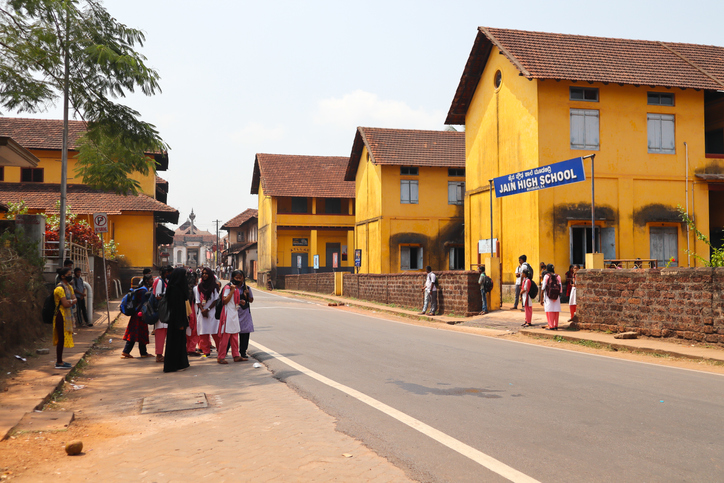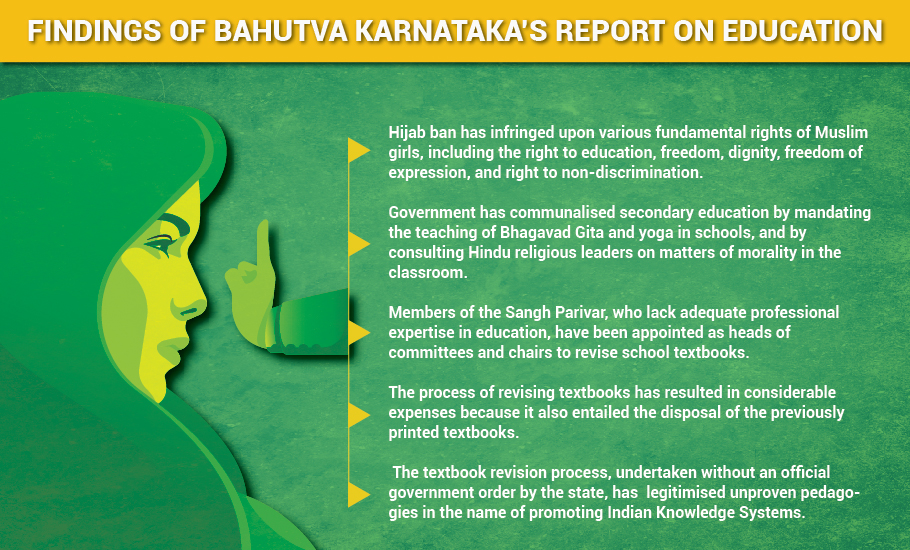
Karnataka education: Report slams Bommai govt for hijab ban, saffron agenda
Brought out by Bahutva Karnataka, the report also raises concerns on delayed scholarships, and unfilled teaching positions

Ahead of the crucial Karnataka Assembly elections, as the BJP ramps up efforts to retain power, a damning report has indicted the Basavaraj Bommai-led BJP government for its systemic attempts to ‘saffronise’ education in the state.
The report, brought out by Bahutva Karnataka, a citizen group consisting of progressive organisations and individuals across the state, outlines a range of concerns, including communalisation of educational institutions through a ban on hijab, revision of textbooks, delayed scholarships, unfilled teaching positions (highest in the country), poor infrastructure in government schools as well as a controversial proposal to privatise them.
The report, the first of over a dozen assessing the current government’s policies in various sectors over the past four years, was released on Wednesday (April 14). Highlighting critical issues within the state’s education sector, it indicates that the ban on hijab in pre-university government colleges resulted in communalisation of educational institutions and triggered violence across the state.
Also read: Karnataka polls: Left parties not in fray to prevent split in anti-BJP votes
The report states that the ban on hijab has infringed upon various fundamental rights of Muslim girls, including the right to education, freedom, dignity, freedom of expression, right to non-discrimination, and freedom from arbitrary state action. The government acknowledged in the Assembly that 1,010 students had dropped out of high school and college due to the ban. It also indicates that approximately 17,000 Muslim girls have dropped out of colleges due to the tensions surrounding the hijab issue. The report, released by Bahutva Karnataka, states, “The hijab has disrupted classroom communication and denied education and dignity to Muslim girl students.”
Seeds of communalism sown in schools
According to the report, the government has aggressively communalised secondary education by mandating the teaching of Bhagavad Gita in schools (in December 2022) and yoga (in 2023), and by consulting primarily Hindu religious leaders on matters of morality, ethics, and nutrition in the classroom.
Additionally, the report highlights that members of the Sangh Parivar, who lack adequate professional expertise in education, have been appointed as heads of committees and chairs to revise school textbooks. This has resulted in significant contributions from Dalit and leading progressive litterateurs being replaced with articles that distort history. “The members of the Sangh Parivar, with inadequate professional expertise in education, have been selectively appointed as heads of committees and chairs to revise school textbooks. Significant contributions by Dalit and leading progressive litterateurs have been replaced by articles that distort history,” the report points out.
The report cites several examples of the revision process in action, including the removal of historical facts from the Class 9 social studies lesson on the 12th-century social reformer Basavanna, which now omits his rejection of the rigid Vedic practices of the time and his subsequent founding of the Lingayat faith. Similarly, the emergence of neo-Buddhism has been incorrectly attributed to growing antipathy towards animal sacrifice, rather than a reaction to the prevailing oppressive Brahminical order.

Additionally, the report highlights that the revision process has incurred significant costs in disposing of existing printed textbooks. The entire revision process, it underlines, was undertaken without an official government order by the state. The report further details that the revision process has legitimized unproven pedagogies in the name of promoting Indian Knowledge Systems.
The report characterises the government’s policies as a “brahminization of education,” citing the promotion of “Satvik” food despite criticism from nutritionists and the food commission. The report argues that this policy runs counter to the interests of disadvantaged children.
The report also highlights that students in various parts of the state have been protesting against the delay or non-payment of several types of scholarships. The scholarships for SC, ST, BC, and OBC students at post-school levels have either been significantly delayed or have stopped being paid altogether. In addition, pre-Matric scholarships have also experienced delays. Scholarships for the children of Beedi workers have been discontinued, and the Maulana Azad National Fellowships, which were awarded to Muslim students, have also been discontinued, the report notes.
Chaos over implementation of New Education Policy 2020
Karnataka was the first state to endorse and implement the New Education Policy 2020 in the orientation and restructuring of education at all levels. However, inadequate consultation and preparation have resulted in confusion and chaos on the ground, the report states.
Also read: Karnataka polls: BJP ministers file nomination papers
It further highlights that government schools in Karnataka have the highest vacancy rate for teaching positions in the country, with 57.7% of posts unfilled. Furthermore, plans for fresh recruitment continue to be deferred. Instead, unemployed engineers are being permitted to take the Teacher Eligibility Test and apply for over 15,000 job vacancies in government schools.
Only 23 percent of government schools have basic infrastructure facilities mandated by the Right to Education Act, the report revealed. “While a majority of government schools lack basic facilities, the government has sanctioned a program of ‘Viveka Classrooms’ which are to be painted in saffron colour ostensibly for ‘architectural’ reasons for Rs 992 crore,” it added.
According to the report, the Karnataka government issued a circular permitting schools to collect Rs 100 or more per month from parents of school-going children for infrastructure, 12 years after the Right to Free Education was guaranteed up to the age of 14 in 2009. This move could be seen as an attempt to undermine the Fundamental Right enshrined in the Constitution. The government had to withdraw the circular after protests from parents, it states.
About the politicisation of education, the report mentions that a circular was issued by the Department of Education to remove the Chairpersons of School Development and Monitoring Committees (SDMC) in all Karnataka Public Schools and appoint local MLAs. The report terms this as a move against the Constitutional mandate, which violates the Right to Education Act. This is encouraging MLAs to misuse school funds and will also politicise educational institutions, the report says.
It suggests that the government is actively pushing for the privatization of schools and the closure of 13,000 government schools under the guise of mergers. Additionally, the government has reportedly decided to establish six new private universities without sufficient public discussion. Ironically, the report also reveals that the Kannada University is at risk of closure due to a lack of funds.
Also read: Karnataka polls: Rebels, ticket aspirants have BJP on a sticky wicket
Furthermore, the report indicates that since 2019, funds allocated for education have declined by almost 1 percent of the State Gross Domestic Product. This is despite the education emergency caused by the Covid-19 pandemic.
The falling learning levels, as highlighted in the ASER Annual Report 2022, are also a cause for concern. The report indicates that the percentage of Class 3 students reading at the appropriate level plummeted from 19.3 percent in 2018 to 8.6 percent in 2022. The closure of government schools for nearly two years due to Covid-19 resulted in significant learning gaps, which could have serious long-term implications, says the report.
“This is the first report on the topic of education. The other sectors covered by the group are Healthcare, Nutrition, Rural Development & Agriculture, Federalism and Democracy. The report on them will be out every fortnight,” says Gurumurthy Kasinathan, a social activist and an expert on public education. He is a member of Bahutva Karnataka and one of the founders of IT for Change.
VP Niranjanaradhya, a public education expert, said the report examines whether the government has fulfilled its promise to “equip children of the state with specified knowledge, skills and values to enable them to become good human beings and productive, socially responsible citizens.” Meanwhile, Vinay Srinivasan, the convenor of Bahutva Karnataka, said the group has rated the government an “E” on a scale of A to F.

